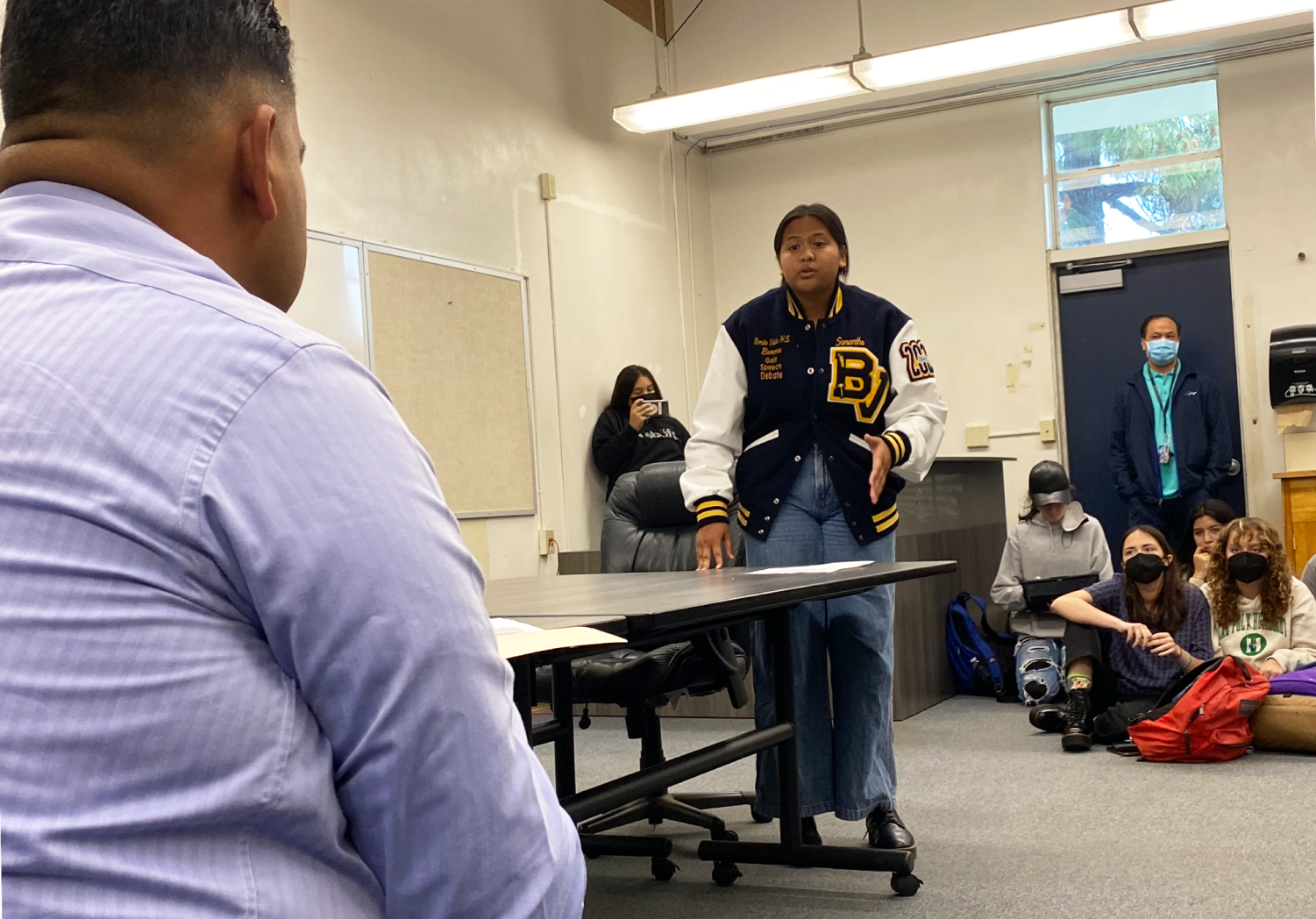Divisive Discussion
Expansion of white robes leads to community wide debates
May 4, 2022
The white gowns at graduation have been a recognition given to International Baccalaureate (IB) Diploma Candidates for the last 15 years. Since its installment, IB Diploma candidates have adopted the white gown as a symbol of the hard work they have done throughout their two years in the program.
On March 14, Bonita Vista High (BVH) parent, Samuel Sandoval spoke out at a Sweetwater Union High School (SUHSD) board meeting against the practice of awarding only IB Diploma candidates the esteemed white gowns at graduation. He called the practice “inequitable,” “discriminatory” and “punitive”. This conversation was organized by senior Kiara Sandoval and her dad who had this conversation in the works months prior. The statement sparked a divisive and prolonged debate about whether the recognition of white gowns at graduation should be expanded to more students outside the circle of IB Diploma candidates.
After deliberating with his Faculty Advisory Committee (FAC), and speaking to IB students in their IB History of the Americas (HOTA) classes, Principal Roman Del Rosario, Ed.D. decided to expand the recognition to students with a Grade Point Average (GPA) of 4.2 or higher and the top 4 students in the Special Education department. During a parent meeting on April 18, IB Diploma parents and students voiced their opinions on the matter. A consensus amongst many parents was that they felt they were kept in the dark.
Every person has a different opinion on the topic based on their own experiences, but the attention to the subject brought on by the board meeting has sparked a school-wide debate.
How it started
“I am here requesting an immediate change in policy with regards to how students earn the right to honor graduates. The current policy is discriminatory because it fails to recognize many deserving students that are in other programs.”
On March 14, Bonita Vista High (BVH) parent Samuel Sandoval made a controversial statement at the Sweetwater Union High School District board meeting calling for the expansion of the white gown recognition. The statement sparked a divisive debate in the BVH community regarding whether the recognition shall be permitted to additional students who are not International Baccalaureate (IB) Diploma candidates. The conversation still persists a month later.
“I think everyone was so afraid to mention it because it was such a controversial topic. I know a lot of people were not happy about [the current practice], or comfortable speaking out. I thought ‘If no one’s going to say something, I might as well,” senior Kiara Sandoval said. Sandoval initiated the conservation with her father. “I got a lot of help from my dad and we were in it together. That’s what initiated it, the fact that it felt as though they were excluding everyone else that they were not IB students.”
The father and daughter pair felt that the current practice was “exclusive” and “wanted to bring awareness to the issue,” according to K. Sandoval. S. Sandoval noted that he became aware of the criteria to graduate in white around December 2021.
A couple of months prior to the board meeting, S. Sandoval emailed IB Diploma Coordinator Jared Phelps about the requirements to graduate in white to get their information correct. After all their information was gathered, S. Sandoval and K. Sandoval spoke to BVH Principal Roman Del Rosario, Ed.D., in a meeting that included Assistant Principals Jason Josafat and Christopher Alvarez.
“I wanted to bring awareness to the community and leadership outside of the district. Many parents from our community at Bonita didn’t know about the practice until I made them aware,” S. Sandoval said. “ My intention was to bring awareness and equity into the equation of recognizing students.”
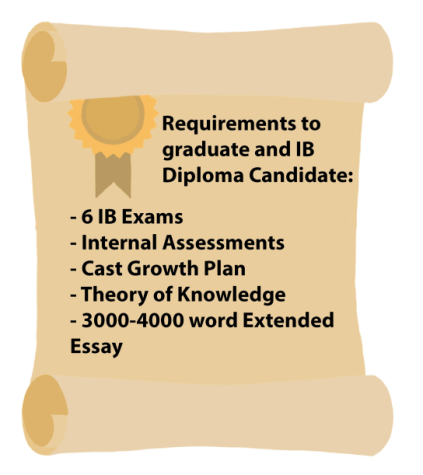
One of the points made by K. Sandoval was that IB Diploma Candidates are not required to have a certain Grade Point Average (GPA) to graduate in white. She noted that it was unfair that non-diploma candidates who achieved a high GPA would not be given the opportunity to have the same distinction. Other schools in SUHSD use GPA as a measure for high achieving students to determine who is granted the different colored robe recognition. K. Sandoval and her father felt that the top students in the special education department and high achieving English language learners should also be able to graduate with white gowns.
“We should recognize all deserving students. Traditionally, the white gown in every other school is used to recognize the honor grants. It’s not just members of a specific club or a specific program. That was my intention, just awareness, and equity into the equation of recognizing students,” S. Sandoval said.
They decided to take the issue to the board meeting to bring more attention to the matter. The statement made at the board sparked a mass discussion around whether the white gown recognition should be expanded. As a result, Del Rosario’s inbox was flooded with emails from parents from both sides expressing their opinion on the matter. K. Sandoval and S. Sandoval achieved their goal of bringing attention to the issue, and after the board meeting, they decided to let the conservation play out.
“They agreed that I had some good points and it was a fair question that I was asking. But they didn’t seem to have any urgency in trying to change the criteria or policy within this timeframe for this year and I didn’t feel that was right,” S. Sandoval said. “ That’s why I spoke at the board meeting. I wanted to share my thoughts and make [the board] aware because I don’t think many people were aware, outside of Bonita, that this was the policy.”
On March 11, the Friday before the board meeting, K. Sandoval went to Ethnic Studies and Advanced Placement (AP) US History teacher Don Dumas’ classroom to share a petition to garner student support for the expansion of the white gown recognition. Dumas proposed the petition to his students and with the help of freshman Daniel Hernandez, the petition amounted to around 165 signatures. This petition was presented at the board meeting.
Dumas shared the petition in his classes because he wanted his students to have the chance to “stand in solidarity.” He added that the majority of the students in his classes signed the petition.
“Students who see something unjust in their school and feel empowered to make that change means we’re doing something correct here on campus. For Kiara and those who supported her, I feel extremely proud of them for wanting to make a change in their community. They didn’t sit back and accept what they viewed as an injustice. They changed it. That’s what school is all about, that’s what we’re here for. I think all the teachers should be very satisfied and gratified that the students did this,” Dumas said.
Furthermore, Dumas agrees with the expansion of students honored at graduation. When proposing the petition in his classes, Dumas brought up the point about GPA. He did this in order to give students a perspective on the current practice that he felt they may not know.
“I wanted the students to understand how it was done at other schools so that they know there’s a difference. The way we do it here is very unique and limiting who we honor with the white gown,” Dumas said. “Sometimes, we mistakenly narrow who we are comparing ourselves to. If we kept it just on this campus, then people might not recognize the injustice and think, ‘Oh well, that’s the way things have always been.’ So, of course, I reject that mode of thinking and always think that we should strive to make our institutions more just.”
Kiara emphasized that the conversation is centered around a matter of equitability. She believes that IB diploma candidates “100 percent deserve” to graduate in white and in bringing up this conservation, she was not trying to “diminish” any of their accomplishments. However, she holds strong to the belief that other students also deserve the same recognition that IB diploma candidates are granted.
“In the end, this was never an argument or attack. This was just a conversation we were trying to have. We knew that in bringing up this issue, people would feel attacked, but in the end, we weren’t attacking the IB program. It had nothing to do with the IB program at the end of it,” K. Sandoval said. “I have immense respect for anybody who does the program. If that suits your needs, that is totally fine. It was about getting recognition for all top students, regardless of whatever program you’re in.”
Discussion with HOTA classes
On April 5, Bonita Vista High (BVH) Principal Roman Del Rosario, Ed.D. gathered senior International Baccalaureate (IB) students into the second and fifth period of IB History of the Americas (HOTA) class. There he had an open discussion regarding the modification of requirements to wear a white gown at graduation.
This community-wide discussion was prompted by Samuel Sandoval’s statement on March 14 at the Sweetwater Union High School District board of trustees meeting, requesting an “immediate” change in policy regarding the way students earn the white gown recognition at graduation. He called the standing policy “inequitable, discriminatory, and punitive.”
“It’s one of those situations that at the end of this process is a right-right dilemma. It’s not saying that you’re wrong and I’m right, but it’s trying to be thoughtful about what’s in the best interest of the school and ultimately what’s best for you,” Del Rosario said to IB students in second-period HOTA.
Del Rosario started the discussion by emphasizing the importance for him to hear student voices. Before he answered questions and received student opinions, he provided background regarding the history of the white robes’ use at BVH. He explained that the installment of the white robes at recognition for IB Diploma candidates occurred 15 years ago under the direction of the former BVH Principal. Additionally, the decision for this year would be a temporary one that would be further discussed later to find a more conclusive solution for future years.
“I’m not comfortable with the timing for this to be how we’re going to change it forever,” Del Rosario said. “We are trying to move on beyond this for the class of 2022 and then reopen it to a broader group at the beginning of the school year. So it’s going to be a conversation for the class of 2022 and then a larger conversation for the class of 2023 and beyond.”
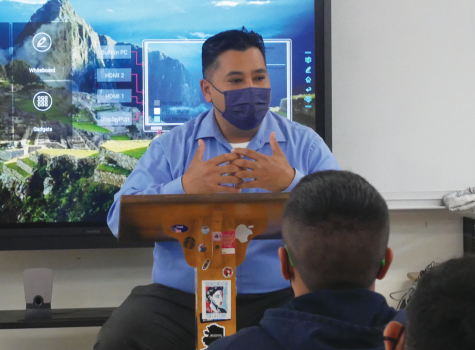
He reassured the candidates that they are guaranteed to graduate in white, this received sighs of relief from students in second period as they had been under the impression that white robes would be entirely removed. The conversation has revolved around whether non-diploma candidates who “distinguish themselves in a remarkable way” should be considered to be a part of the white robe distinction.
“There is an argument that we should have never had the white robes and we should have stayed with blue robes from the beginning. I, as principal, said that is out of bounds,” Del Rosario said. “For the class of 2022, there’s nothing that’s going to dissuade me from allowing them to walk in white.”
During second period, IB Diploma Candidate and senior Bibiana Martinez asked about the requirements for non-diploma candidates to graduate in white. Del Rosario then mentioned that one idea would revolve around a certain Grade Point Average (GPA) requirement students would have to meet. However, there is no definitive solution or number yet. While there was not a definitive number, numbers such as 4.2 and 4.3 were thrown around numerous times as an example.
“Right now, I’m going to ask for input from our teachers on what would be criteria where we have a very high threshold of an expectation and do not minimize the hard work IB students have done,” Del Rosario said.
The white robe distinction was also talked about being opened up to top students in the special education department. They do not have access to Advanced Placement (AP) and IB courses which mean they are not able to participate in the IB program or meet the potential GPA requirement that can be acquired through taking AP classes.
“40 students are in our Fundamental Program, and they’ll never have an opportunity to be an IB candidate. They’re not allowed via their [Individualized Education Program] IEPs and their learning disabilities. Why not have a criteria where the top two or three of that group join?” Del Rosario said.
Continuing the conversation, IB Diploma candidate and senior Henry Tang shared his opinion in favor of expanding white robes to other students. Tang believes there are numerous non-diploma candidate students who deserve recognition.
“I know a lot of people who are very talented and academically accomplished, but they’re not in the IB program. Part of that is how stiff the requirements to graduate or to graduate with an IB diploma are. Many classes are two-year courses. I think that’s unrealistic for a lot of people to attain in this sector,” Tang said.
In period five, multiple students spoke out with strong passion about their complete disapproval to expand the number of students who would wear the white robe during graduation. Less room was left for Del Rosario to respond to each comment or question as more students wished to voice their opinions compared to the second period. IB Diploma Candidate and senior Anahi Marquez-Silva was one of the students not in favor of extending the number of students who would qualify to wear the white robe.
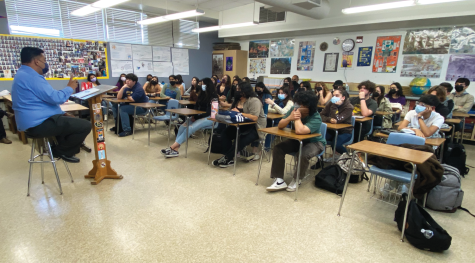
“This is a really big decision for our school. It’s a little premature to make such a big decision on our graduation specifically because regardless of if you still honor us, you are still pulling us out of the rug if you give somebody else [the recognition]. [IB Diploma Candidates were] under the impression that we would be the only ones graduating in white,” Marquez said. “I don’t think this year is the time to change because you’re only going to be deliberating for a week and we’ve been deliberating and working for this for four years.”
IB Diploma Program Coordinator Jared Phelps was present during the conversation in both periods. Phelps listened to student opinions while giving his own thoughts on the matter. He served as a grounding voice on the issue, often offering alternate points of view to try and expand students’ stances on the matter. Similarly, Del Rosario explained how divisive the issue has made BVH.
“I always firmly stood behind is just because we have always done something some way does not mean that we should keep doing things that way. It doesn’t mean I don’t think that IB students shouldn’t be graduating the white, but if the only justification we have is that it’s ‘tradition’ then that’s a crappy reason,” Phelps said.
The input gathered from both periods was used in a Faculty Advisory Committee meeting the following Thursday to discuss the best way to handle the situation. The practice of using white robes for IB Diploma Candidates has been practiced for 15 years. Del Rosario’s decision is expected to come out early this week.
Martinez in her final comment during the second period noted the importance of keeping the conversation civil and respectful.
“It’s recognition but don’t make it as cutthroat as it is right now. Don’t attack people, don’t make people feel bad, or call people things ignorantly,” Martinez said. “I think that’s also our job to start talking to other people that we might not have the same opinion with. It’s our job right now to try to destigmatize how heated the argument has become in certain areas.”
The decision
On April 12, Bonita Vista High (BVH) Principal Roman Del Rosario, Ed.D., sent an email to International Baccalaureate (IB) Diploma candidates announcing the expansion of students eligible to wear a white cap and gown for graduation. According to the email, all IB diploma candidates, students with a 4.2 Grade Point Average (GPA) or higher, and the four highest achieving students in various special needs programs will graduate in white gowns.
At graduation, IB diploma graduates will be distinguished by a gold hood, whereas non-IB graduates will be recognized in only a white robe. Additionally, Del Rosario hopes to create a “symbol of unity” by having IB and non-IB graduates sit next to each other during the graduation ceremony.
“When I was your age and a student here at Bonita, the only two ways that students were distinguished were with a CSF sash and the golden hood for IB graduates. There were no different colors of gowns,” IB Diploma Coordinator Jared Phelps said.
The decision will only apply to the class of 2022 and will be readdressed for a permanent decision for the following years. As a result of this decision, the tension between non-IB and IB graduates has increased in the weeks following Del Rosario’s decision.
Currently, the class of 2022 has 51 IB diploma candidates, which according to Del Rosario’s email, is five to 10 percent of the seniors at BVH. The new decision will have an additional 45 students set to wear white. That totals to 96 out of 542 seniors—18 percent of the class of 2022—that will be graduating in white.
“As I got more feedback I had a stirring of my conscience thinking about it,” Del Rosario said. “One of the famous quotes from Dr. King that I often think about said, ‘Justice delayed is justice denied. I knew well and good that it was definitely within my authority to make this decision, and it was something that I just feel very strongly about.”
Before making the decision, Del Rosario consulted the Faculty Advisory Committee (FAC) to gather their feelings on the issue. He felt validated in his decision due to the 100 percent consensus from the committee that his decision was the right call.
“They were divided between two responses. One was that they agree that we should look at our criteria to expand who we acknowledge. Then the other group of responses was that they felt that we should eliminate the white gown and go back to what it was 15 years ago,” Del Rosario said. “One theme from those FAC members is that we really have to emphasize that we’re one school with different programs that we value.”
Phelps was an attendee of the FAC meeting and from his perspective, there was not much discussion from the group about the decision. The goal of the decision was to make the practice of recognizing students more “unified” rather than “divisive”. Additionally, Del Rosario emphasized that the decision was not intended to diminish the accomplishments of the IB Diploma candidates.
“I still struggled to make the decision, because I still thought it was deeply unfair for students that had that expectation for at least the last two years to change that expectation weeks before graduation. It was something that I struggled with, but ultimately, in my heart, I felt that it was the right thing to do. The students were still promised to walk in white, but we’ve expanded it to include a few more students,” Del Rosario said.
Advanced Placement (AP) US History and Ethnic Studies teacher Don Dumas believes that academic achievement cannot be measured by GPA. However, he views the 4.2 GPA requirement as a “pretty high” standard.
“When [Kiara] first started this petition and spoke to the principal and other teachers, I thought that there was a good chance that we could fix this and I was thinking [a GPA of] 3.75, 3.8 but 4.2,” Dumas said shocked. “I thought dang, that’s still pretty high. But it’s a step in the right direction.”
Phelps’ main concern regarding the decision was the timing due to, in his eyes, there not being enough time to “adequately” reflect on the merit of practice. Despite issues with timing, Phelps agrees with the changing of the white robe practice. However, he emphasizes that now was not the correct time for the decision.
“I don’t think that I am happy with the decision either but I could have been more okay with the decision [if it] were placed in a time [where] thing’s were more appropriate; where there was more time given for reflection; where there was more time given for students to work through those feelings and even for that matter to make changes to their coursework,” Phelps said.
In regards to the statement made at the board meeting, Phelps believes that it was “deeply unrepresentative” of the IB program. Furthermore, he characterizes the statements as “emotionally laden”.
“Something that makes it particularly difficult is, I agree that we should look at revisiting this thing. But the idea that a very, very poorly misrepresentative comment has led to a change, feels like it lends credence to something from before that was not correct. That’s not something that can easily be fixed,” Phelps said. “The end message is this complaint was registered and a change was made.”
IB, AP, and Honors Chemistry teacher Jeffery Rivera shared a similar sentiment to Phelps regarding the timing of the decision. Rivera believes that the decision should have started with the class of 2024.
“I understand his [DDRs] vision in trying to make it more inclusive to acknowledge and recognize our highest achievers but you did have a policy in place already, and for you to suddenly change it in such a short amount of time with graduation being so close–it doesn’t make sense,” Rivera said. “Unless it’s an emergency—and this doesn’t qualify to me as an emergency.”
Dumas describes Del Rosario as an “equity fighter” and although he was surprised to see how quickly Del Rosario made his decision, he was not shocked that Del Rosario ultimately decided on this course of action.
“Graduation is right around the corner so you can’t really sit on it too long. But maybe a principle that was a little less courageous might have said, ‘Let’s push it off until next year, but he has the courage to make the decision right away. I think that it did take a lot of courage to do that,” Dumas said.
AP student senior Kiara Sandoval was happy with the decision that was announced. Sandoval added that the decision had been what she and her dad, Samuel Sandoval, intended to be. Additionally, she was glad that the decision was implemented this year, even though the goal was to implement it eventually.

“It’s an honor to graduate in white, but this was never about me. I didn’t do this because I wanted to graduate and white so badly that I decided to blow this whole thing up. I honestly did it just because I know so many people who were deserving of it. So I’m really grateful to have the opportunity to graduate in white; I think it’s a really great honor, but that was never like my goal in this,” K. Sandoval said.
AP student Sydney Wunderly also shares a similar opinion. She is a student who qualified for the expanded white gown criteria and has taken 11 AP classes throughout her high school career. She noted that she did not agree with the IB students sitting in their separate groups at graduation because she believes that goes against what the decision was trying to accomplish.
“I sympathize with IB kids because I know what some of them are upset about. They were promised that they’d get their white robes and be specially recognized. I understand where they’re coming from, but at the same time, I think that it’s really good that other kids get to be recognized as well. Although it still separates people, I feel like there’s no harm from it,” Wunderly expressed.
However, AP student and senior Maxwell Anderson does not believe a wider range of students should graduate in white as he sees it to be unfair to the IB Diploma candidates. Anderson also qualifies to wear the white gown at graduation and while he expressed that he was “excited”, he feels that IB students put in more work considering the workload associated with IB classes.
“They both should be recognized but not in the same way as IB. Recognizing both achievements in the same way is unfair to IB students who were promised, when they signed up, that they would be the ones graduating in white; not all these additional people,” Anderson said.
Seniors and IB Diploma candidates Lulu Castruita and Samantha Bianes both saw the white robe as a motivating factor while they were in the IB program. They both saw the white robe as a symbol of the hard work and sacrifices they put into the program. Similar to Anderson, Bianes mentioned that she believed that IB Diploma candidates deserve the white robe recognition they were promised due to the different caliber of work IB students are asked to complete.
“With the decision that Dr. Del Rosario made by giving a 4.2 student a white robe, I feel as though it’s devaluing my work. I think, ‘Why did I go through all that time and sacrifices that I put myself through to have these other students who have a 4.2 get a white robe?’ I had a 4.2 sophomore year. I could have taken the easy route and I still would have been recognized for my work. Now my recognition and achievement that I went through in the IB program, to me, feels devalued,” Castruita said.
Senior and IB Diploma candidate Henry Tang has been consistent in his position of support for the expansion of the white robe recognition. He is a firm believer that there are students outside the IB program who have demonstrated themselves well academically and deserve the same recognition he is granted as an IB student.
“IB is pretty unique in how they do things and there’s a level of commitment and work and accomplishment that should be awarded. That’s true; I’m not arguing against that. I’m an IB student myself. The thing is, IB isn’t the only place where people have demonstrated that,” Tang said. “I really do think they deserve some form of recognition, at least equal to me. These are people I looked up to, I shouldn’t be graduating in a position higher than them.”
For next year’s decision, Del Rosario wants to gather more voices from the community. Even though he believes it is a challenge to consider all voices on the matter, he holds the belief that it is “meaningful” to have a lot of stakeholders involved in the conversation.
“I want to hear from all sides and really think about how we are going to honor our students in a way that hopefully mixed graduation is a celebration and it should be a unifying event, not a divisive event,” Del Rosario said.
The aftermath
On April 18, International Baccalaureate (IB) Diploma Candidate parents and students filed into the Bonita Vista High (BVH) Parent Center. At a long table, the parents and students sat facing BVH Principal Roman Del Rosario, Ed.D; the majority of students sat on the floor as seating availability ran out. Del Rosario sat alone on the other side of the table. He informed them of his process for the decision and ways in which IB Diploma candidates will still be celebrated at graduation.
IB student-parent Annabel Bianes requested a meeting with Del Rosario, regarding the recent decision he announced on April 12 and 13 to expand the number of students awarded the white gown recognition. Bianes hoped to receive clarity on Del Rosario’s decision to grant students with a 4.2 Grade Point Average (GPA) or higher the recognition of wearing a white gown on graduation along with the IB students.
“I know there’s going to be disagreement but in my heart, I need to be able to sleep with my conscience. In my heart this is in the best interests of our IB program,” Del Rosario said.
He ensured that parents and students understand that his rationale for the decision is “not to diminish the accomplishments of either of our students.” He leads BVH to follow the footsteps of other schools in the Sweetwater Union High School District, saying that graduating in a white gown is a “standard practice and understanding that is based on the highest achieving students which are based on GPA.”
Annabel Bianes and many other IB parents’ main concern, which prompted them to hold this meeting, was Del Rosario’s “lacked transparency” in his decision. During the meeting, parents nodded in agreement with one another as each spoke about their concerns. Parents voiced their issue with not being contacted regarding their opinion on the matter. For them, the decision came as a shock.
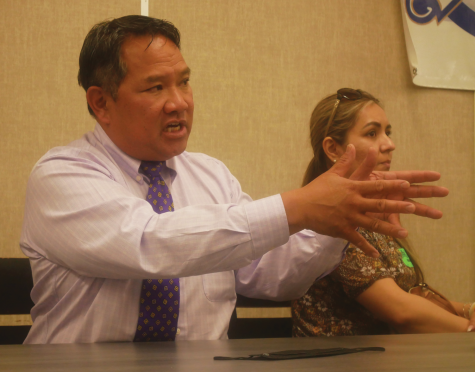
“You didn’t get input from us IB parents in regards to turning it around and springing this on us a month and a half before graduation, I don’t think it’s fair. The students work so hard and they had already programmed it in their minds that, ‘Hey by joining the program, I’m going to get to wear a white gown,’ but now it’s switched. [They think] ‘Oh, why did I even do this?’” IB parent Anthony Bianes said.
Other IB parents such as Juan Castruita and Laura Shimizu echoed the sentiments of Anthony Bianes regarding Del Rosario’s failure to gather IB parent opinions during the decision-making process. Shimizu expressed that she felt hurt by Del Rosario’s decision. Additionally, Castruita emphasized that parents are also part of the BVH community and referred to the tradition of the white gowns as a “social contract”.
“When these kids joined this program two years ago, there was a certain expectation that you do this,” Castruita said. “We had rules, we had an agreement, we had an understanding between these children and parents and yourself as the administrator and that has been broken. It isn’t about the robes. It’s about the break of that commitment between ourselves.”
A majority of the parents shared that the white robe requirements should not have been a change made to this year’s graduating class. Parents claimed that non-diploma candidate students were already aware of the recognition IB graduates earned. Many parents expressed that if students wanted to receive the white robe recognition, they should have joined the IB program.
“I don’t agree that next year you can change it because at this point the juniors already gave up a year. The understanding was that next year they’re going to graduate in white and they’re going to be recognized. So if you guys do want to make a change, it has to be through the process,” Shimizu said. “It’s called respect, we have to follow the steps to do that. No, they graduate in white, juniors graduate in white, then we start the process.”
In the middle of the meeting, multiple IB Diploma candidates shared their experiences on how the decision has impacted them and why they disagree with the choice Del Rosario made. IB Diploma Candidate and senior Samantha Bianes started off the student statements. S. Bianes pointed out that IB is more work than AP in her experience due to the Internal Assessments and other work needed to be completed to obtain the diploma.
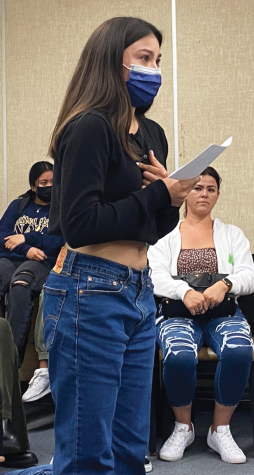
“I can stand here today and say 100 percent that IB is 10 times the amount of work as AP. Now they are just as smart and just as capable but they went into AP knowing that they wouldn’t be graduating in white. We were told our sophomore year you can take either AP or IB. IB graduates in white, AP does not. If AP was just as challenging and a 4.2 is just a comparable then why didn’t the AP students take [IB]? Every single person here made a sacrifice and now that sacrifice is going unnoticed because one parent complained that their students weren’t getting recognized when she knew that she wouldn’t be getting recognized and that’s a choice that she made,” S. Bianes said in her speech at the parent meeting.
Throughout the testimonials, fellow IB students started to cry at their peers’ statements. Many IB students and parents brought up the sacrifices made by their families in order to be in the IB program. Salutatorian, IB Diploma Candidate and senior Andrea Sanchez-Veliz shared the sacrifices her own family made.
“Both of my parents were immigrants who decided to move to the United States…When it came time for me to join high school, I advocated for Bonita so that I would become an IB student,” Sanchez-Veliz said. “We did not work so hard so that my family’s work would be invalidated 30 days before we graduate. We overcame not only academic obstacles that every IB student faces but social and economic obstacles that every immigrant faces in America today. Every student faces obstacles in their life, but IB students chose to take on the challenge that is this program and had the courage to take on what an IB student is.”
Towards the end of the meeting, Del Rosario was asked whether he was going to reconsider his decision and was pressed heavily by parents and students on why he decided to follow through with the recommendation for the class of 2022. Del Rosario was not able to clearly answer the question regarding the timing of the decision, leading to student and parent feelings to escalate.
The meeting ended abruptly with parents and students walking out when Del Rosario stated that he stood by his decision. Senior Jaidy Leyva asked out loud, “So you wasted our time?” to which a parent in the meeting, while walking out said, “Yes he did”.
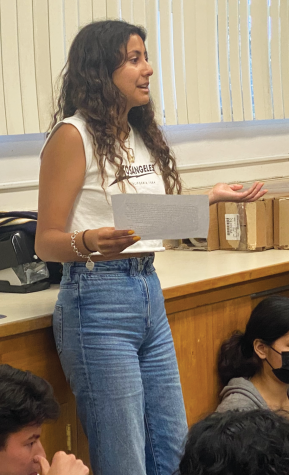
S. Bianes added that she believes there have been misconceptions about IB Diploma candidate students’ stance on this matter. Mainly, IB Diploma candidates do not believe that earning a 4.2 GPA is not a worthy accomplishment and not deserving of recognition. However, many IB students hold the stance that non-diploma students should have a different type of recognition other than the white robe, as many IB diploma candidates hold the white robe to be “symbolic” of their experience in the program.
“I don’t like that it’s turning into IB versus AP. I hate that. IB students don’t think they’re better. IB students don’t think that they’re smarter. That’s not the case. We simply think that the IB robes were something symbolic and important to us,” S. Bianes said.
Del Rosario mentioned that he may be open to the re-evaluation of the decision. Additionally, after the parent meeting, Del Rosario expressed that he felt fortunate to be in a community where students feel free to advocate for themselves.
“I think of the meeting I had with our IB parents and it reminds me of how fortunate I am as a principal to be in a community where so many parents fiercely advocate for their children. At the end of the day, it’s a positive thing,” Del Rosario said.
IB Diploma Coordinator Jared Phelps recalled a moment during the meeting in which Anthony Bianes commented that the decision made by Del Rosario could mean the end of the IB program as it is “easier” for students to get a white gown than students would not want to pursue the program. However, Phelps, as he credits to his idealist nature, does not believe that that statement holds true.
“I have to hold out hope [Anthony Bianes’s statement is] not true. Because if it is then it’s a depressing thing. It means that all people were really ever doing it for the white robes and I was just fooling myself,” Phelps said.
